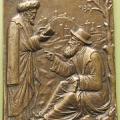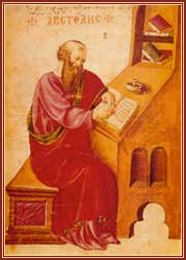82 - Lost and Found: Aristotelianism after Aristotle
Peter looks at the history of Aristotelianism up the time of the Roman Empire and the beginning of commentaries on Aristotle's works.
Themes:
• P. Adamson (ed.), The Peripatetic School through Alexander of Aphrodisias (issue in honor of R.W. Sharples), Bulletin of the Institute of Classical Studies 55 (2012).
• H. Baltussen, The Peripatetics: Aristotle's Heirs 322 BCE-200 CE (London: 2016).
• J. Barnes, “Roman Aristotle,” in J. Barnes and M. Griffin (eds), Philosophia Togata II: Plato and Aristotle at Rome (Oxford: 1997), 1-69.
• A. Alberti and R.W. Sharples (eds), Aspasius: the Earliest Extant Commentary on Aristotle’s Ethics (Berlin: 1999).
• H.B. Gottschalk, “Aristotelian Philosophy in the Roman World,” Aufstieg und Niedergang der römischen Welt II.36.2 (1987), 1079-1174.
• M. Griffin, Aristotle's Categories in the Early Roman Empire (Oxford: 2015).
• D. Konstan (trans.), Aspasius: On Aristotle Nicomachean Ethics 1-4, 7-8 (London: 2006).
• R.W. Sharples, Peripatetic Philosophy 200 BC to AD 200 (Cambridge: 2010).
• R.W. Sharples and R. Sorabji (eds), Greek & Roman Philosophy 100 BC-200 AD (London: 2007), vol.2.







Comments
Acknowledgements
I know what you're thinking.
"Had their way with Aristotle while promising to respect him in the morning." Nice.
filling the gaps
Peter,
Just a short note to express my appreciation of this series. I've got a PhD in philosophy, with an interest in its history. But there were many gaps in my knowledge of its history. One was the fate of Aristotle's writings in late antiquity. Another was the translation of Greek philosophy into Arabic. You did a great job on both, and on the many other subjects I've heard you talk about.
In reply to filling the gaps by Steve
Gaps
Thanks! Glad you have found the series useful.
Aristotelianism
If Strabo's account of the fate of Aristotle's works is false, as you seem to believe, then isn't there still a puzzle about why his works are so poorly known, let alone defended, in the centuries after his death?
Were Aristotle's works in the library at Alexandria?
And what was going on in the Lyceum over those centuries?
In reply to Aristotelianism by Steve
Reception of Aristotle
Well, I think the short answer is that Aristotle was known to some extent but not seen yet as a major figure; there were some followers of course, starting with Theophrastus, but he didn't become a truly central figure until arguably the 2nd c AD with Alexander of Aphrodisias, or perhaps before that in the 1st c BC. I don't think the Lyceum was a going proposition during this time period in the way the Academy was.
Exoteric works and simplified doctrines
Hi Peter, been listening to the podcast for about half a year now, and I've found it really helpful for gaining a broader familiarity with the philosophical comings and going of a given time period (ancient and Hellenistic periods so far), rather than the focus on a couple of figures that you tend to get from most histories.
You mention in this episode that, until later (I think 2nd c AD you said), most people who read Aristotle would have been reading his exoteric writings rather than the esoteric works, which only Lyceum students or other close adherents would have studied, at least extensively. You also note that people like Cicero and Seneca seem to have a shallow or simplified understanding of Aristotle's ethical views. Could this have been because they would have been getting this from the exoterica
Exoteric works and simplified doctrines
My previous comment was submitted before I finished it, but I think you get where I was going with that: could they be reporting the doctrines as presented in the exoteric writings accurately?
In reply to Exoteric works and simplified doctrines by David
Recepion of Aristotle
I think there are two distinct things going on here actually. The exoteric works, which were more polished and apparently more Platonist in outlook, do seem to have circulated up to the time of Cicero, hence his famous statement that Aristotle had excellent style (which as you can hear in the Renaissance series, led humanists like Bruni to insist that the esoteric works had excellent Greek because they didn't appreciate the distinction between the two bodies of writing). But I think the point about simplifying his ethics does have to do with the esoteric works and in particular the Nicomachean Ethics, which say that external goods are important to the good life - rival schools took exception to that and made it a key claim of Aristotelian ethics, which I think it really wasn't.
By the way I just devoted a seminar here in Munich to the Pseudo-Aristotle work On the Cosmos, which was interesting in part because it does use the esoteric works quite a lot, and it is probably before the edition by Andronicus in the 1st c BC. (Though its dating is very disputed.) So that may show that the esoteric works already had readers in what we think of as the Hellenistic period, to a greater extent than we might think.
Add new comment